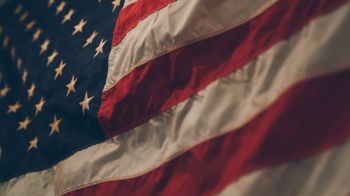A year in America: Students reflect on studying abroad during the Trump administration
By: Stephanie Allen
Last updated: Wednesday, 30 January 2019

Racial segregation and caution about expressing strong political opinions are just some of the things American Studies students from the University of Sussex witnessed during their year in the United States, according to the latest episode of Trump Watch Sussex.
Invited onto the podcast by Dr Melissa Milewski, Senior Lecturer in American History, four American Studies students - Sophie Clark, Daniel Parker, Matilda Vojak and Olivia Grimes - reflected on their year abroad and how life has changed under the Trump administration.
The four undergraduate students revealed that there was a constant battle within American universities to allow both Trump supporters and protesters freedom of speech, while not appearing to be leaning too far to the left or right politically.
Daniel Clark, who spent a year in Boulder, Colorado, said that during class discussions, “It felt like everyone was treading on eggshells. The political climate felt quite volatile.”
Racial divide also seemed to be a running theme for the students, despite being located in different parts of America.
Olivia, who spent a year in Roosevelt University, said: “A lot of the white students that I met who lived in the suburbs of Chicago, they weren’t very politically engaged.
“I think most of them hadn’t voted in the presidential election. Even though they said didn’t like Trump they also weren’t particularly bothered by him.
“Whereas all the students of colour I spoke to were very politically engaged. All of them had voted in the election if they were able to.
“We would have some class discussions that were really interesting but really charged, and they could get quite angry and quite volatile. These were people who had always known about these issues in a personal sense - it was what was going on in their own lives - but with the Trump administration, they had started to see how it was all connected and a much bigger issue.
“The white students weren’t that bothered because they weren’t being threatened by the administration in the same way.”
Sophie, who studied for a year at Berkeley, California, agreed and added, “People directly threatened by the administration were the ones who were most engaged and actually doing something.”
However, the four also questioned whether the apathy from white students was due to ‘fear of not being able to change anything.’
Matilda, who spent a year at Oregon State, said: “A lot of people I knew were trying to distance themselves from things. In Oregon it was very distanced from the political climate anyway. They felt like they couldn’t do anything about it.”
However, the racial segregation between white and black communities was something the students also witnessed in a physical sense.
Sophie explained how, after moving to Chicago, she was shocked at how segregated the city was.
“You could go from one block to the next block and you’d be the only white person. It was crazy.
“It’s scary to see that these people are living alongside one another but never interact.”
David also saw harsh boundaries between black and white communities. Visiting family in Detroit, Michigan, he said: “You could see where the white neighbourhood ended and the black neighbourhood began. The grass had been mowed and the street lights were lit up in the white neighbourhood but you’d go to the black neighbourhood and that wasn’t the case.
“The boundary between black and white seemed really obvious and it was quite frightening.”
After discussing various protests and polarisation of the media on the podcast, the students unanimously agreed that until they lived in America, they hadn’t quite understood how Trump had been voted in as President. The answer left them feeling uninspired and concerned.
Matilda explained: “I’ve come back with the understanding that it wasn’t extreme radical Republicans who voted him in necessarily. It was people who are like me and were brought up in the same way as me.
“I think it’s very easy to sit here all these miles away and think this is just something caused by a very extreme group of people but that’s not the case. That’s probably what terrified me the most and what I came to realise.
“It’s everyday people. It’s college students who liked what he said about taxes. It’s people who believe they are self-made and want to keep that.
“I think that’s what I came away from my year abroad realising about American politics.”
Olivia added: “It’s what Trump represents less so than his politics.
“He’s very symbolic as a President […] so it’s what he represents for people and that’s what they find important. We might not agree with it, but that’s what they want in their leader and we can’t really argue with that.”
To listen to the full episode, visit Trump Watch Sussex or download from iTunes.

